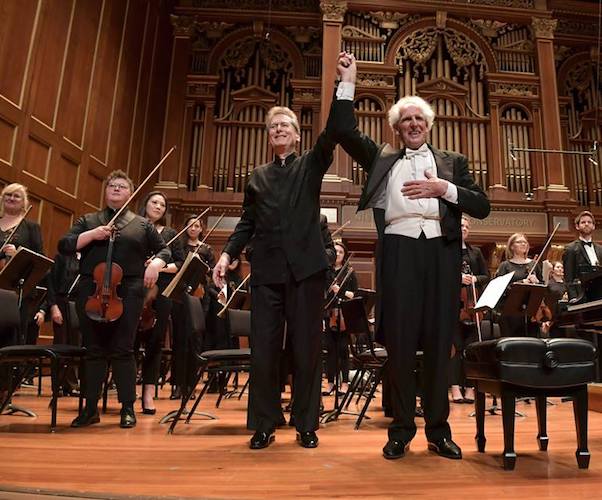Classical Concert Review: The Boston Philharmonic Orchestra Plays Beethoven
By Jonathan Blumhofer
Bread-and-butter of the orchestral repertoire though this music may be, there was no complacency to be heard in the orchestra’s playing of it.

Pianist Robert Levin and Boston Philharmonic Orchestra conductor Benjamin Zander. Photo: BPO Facebook
“Canonic favorites, vitally played,” neatly sums up the Boston Philharmonic Orchestra’s (BPO) current season. A year that marks both the ensemble’s 40th birthday and music director Benjamin Zander’s 80th, it’s one that doesn’t wander too far afield, program-wise. But when conductor and orchestra are entirely simpatico and leaving nothing, interpretively, to chance, that doesn’t really matter, does it?
It certainly didn’t on Sunday afternoon at Sanders Theater, where Zander and Co. wrapped up their third concert series of 2018-19. The afternoon was devoted entirely to the music of Beethoven: the Coriolan Overture, “Emperor” Piano Concerto, and Symphony no. 5. And, bread-and-butter of the orchestral repertoire though this music may be, there was no complacency to be heard in the orchestra’s playing of it.
Their account of the Fifth Symphony, for one, was rousing.
In his Beethoven, Zander adheres to the composer’s famously aggressive metronome markings. Accordingly, Sunday’s was lively and brisk take on this favorite.
That certainly aided things to a point: there was a bracing dose of in-built intensity to the BPO’s playing; a kind of improvisatory, seat-of-the-pants thrill, too (a couple of cracked notes here and there didn’t hurt that impression); plus a clarity of line and gesture that can be lost in more portentous interpretations.
But this was also a very carefully-prepared reading, thoughtfully shaped and texturally lean. You could hear everything that was going on, from the iterations and transformations of the opening tattoo that crop up in sometimes rather unexpected places during each of the four movements to the beguiling coloristic effects with which Beethoven filled the score.
More than that, the orchestra seemed, even more than usual, to be treating the Symphony as a massive bit of chamber music, listening across sections with uncommon sensitivity, orchestral families responding to one another and blending correspondingly. As a result, this was a Beethoven Fifth at once familiar and remarkably strange-sounding, its singular structure coming across with remarkable force.
And its expressive depths were amply tapped.
The first movement was taut as well as breathtakingly quick. It was epic, sure – in its concision and expressive directness, rather than its gestures (which still came across potently). Zander teased out the second’s mix of playfulness and elegance, while the third, with the striking instrumental doublings over its last third, was wonderfully tempestuous. The finale blazed.
In a word, this was a thrilling Beethoven Five. Better: given how Zander and the BPO allowed the music’s mix of well-known gestures and arresting quirks equal opportunity to speak, though, it was one that actually sounded genuinely revolutionary.
Before intermission, pianist Robert Levin joined the BPO in a mighty, fluent performance of Beethoven’s mammoth Piano Concerto no. 5. This expansive 1809 score straddles the line between the Classical and Romantic concerto traditions, balancing elegance and proportionality with bravura solo displays and episodes of searching expression
Levin’s take of its demanding solo part emphasized the music’s Classical restraint, fired though it was by a terrific sense of color and balance between the hands, as well as rhythmic exactitude. Indeed, even in moments when his tone was plush (like during the second movement, or the first movement’s second theme), Levin’s articulation of the part remained pert and active, never flabby.
Zander and the BPO ably matched him in style, bringing a strong sense of direction to their accompaniment. The Concerto’s first movement was warm and noble, the second discreetly colored (highlighted some notably vulnerable playing, particularly from the woodwinds). Its finale danced with rollicking, characterful abandon.
Afterwards, Levin offered a short, captivating encore: a little set of variations on “Happy Birthday” in honor of Zander’s natal day (next month).
Given the rest of the afternoon, the Coriolan Overture that began Sunday’s concert might easily have been swamped by what came afterwards. This Coriolan, though, burned bright, marked by galvanic ensemble work, a strong sense of dramatic shape, and some welcome, edgy brass attacks to boot.
Jonathan Blumhofer is a composer and violist who has been active in the greater Boston area since 2004. His music has received numerous awards and been performed by various ensembles, including the American Composers Orchestra, Kiev Philharmonic, Camerata Chicago, Xanthos Ensemble, and Juventas New Music Group. Since receiving his doctorate from Boston University in 2010, Jon has taught at Clark University, Worcester Polytechnic Institute, and online for the University of Phoenix, in addition to writing music criticism for the Worcester Telegram & Gazette.
Tagged: Benjamin-Zander, Boston Philharmonic Orchestra
